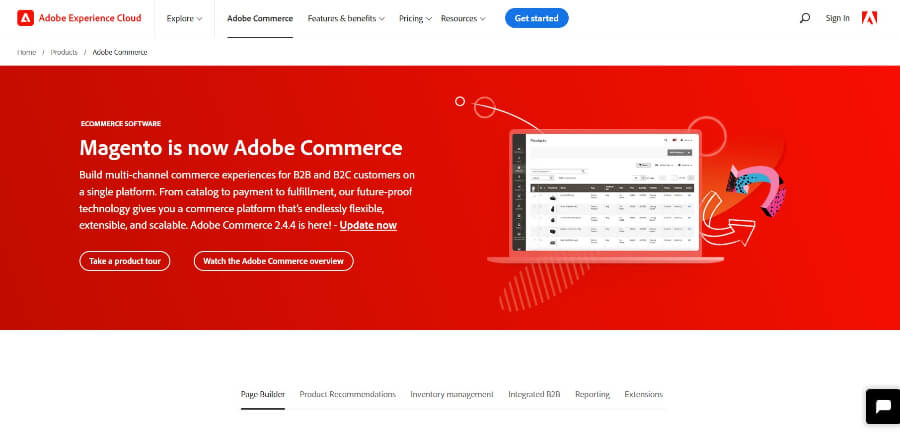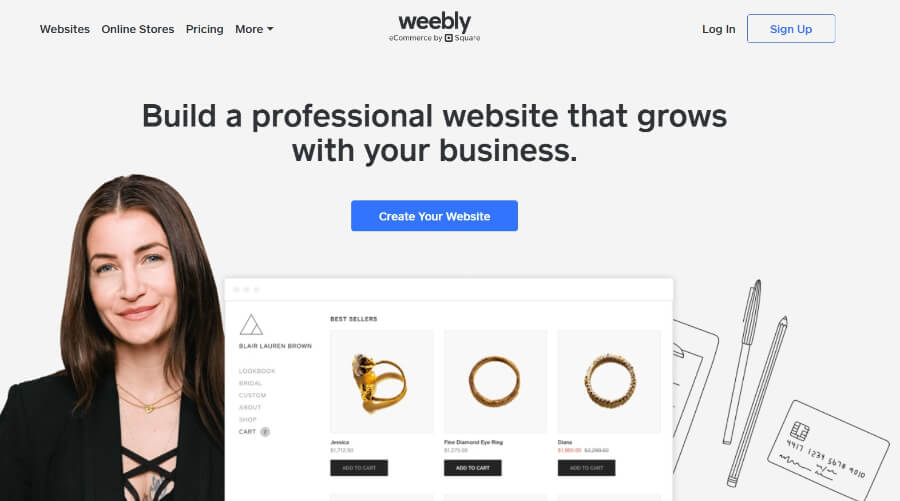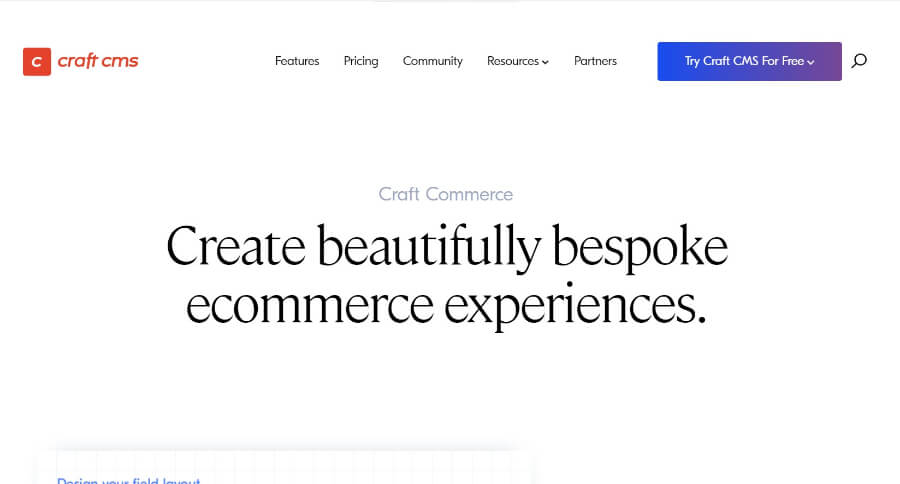The Best Ecommerce Platform for SEO in 2024

SEO is one of the most important aspects of any e-commerce website. Without it, you will not be able to generate traffic or leads from your site. In this blog post, we will discuss the 9 best e-commerce platforms for SEO in 2024. We will also talk about why SEO is so important for e-commerce websites and how to optimize your site for better search engine rankings.
9 Best Ecommerce Platforms for SEO of 2024
Whether you’re launching your first e-commerce company or adding to an existing one, the eCommerce platform you choose has a significant influence on your success. It’s critical to have the finest e-commerce platform and pay attention to such details as how simple it is for potential consumers to locate you and how smoothly your business runs.
- WooCommerce – The best platform for SEO
- BigCommerce – the most popular eCommerce platform
- Shopify – The best eCommerce platform for startups
- Wix – The best eCommerce platform for enterprise market automation
- Squarespace – The best eCommerce SEO platform for design
- Volusion – The best for eCommerce operations
- Adobe Commerce (Magento) – The best for eCommerce developers
- Weebly – The best for small businesses
- Craft Commerce – The best for bespoke eCommerce
WooCommerce

If you’re looking for an eCommerce platform that is both SEO friendly and cost-effective, WooCommerce is the way to go. It’s a plugin for WordPress that turns your site into a fully functioning online store. You can use it to sell physical or digital products, as well as services.
Among its features are:
- An SEO-friendly design that helps your site rank higher on search engine results pages;
- A user-friendly interface that makes it easy for customers to navigate your store and find what they’re looking for;
- A wide range of customization options so you can create a unique store that reflects your brand.
This platform allows you to take full control of your SEO, from title tags and meta descriptions to product descriptions and URLs. You can also use WooCommerce’s built-in blogging tool to create content that will help improve your SEO.
Pricing: The platform is free but with the possibility of upgrading to a Premium plan. The hosting price begins at $6.95/month and the price for a domain name is $15/year.
BigCommerce

If you’re looking for an eCommerce SEO platform that is both popular and SEO friendly, BigCommerce is the best choice. It’s used by some of the biggest brands in the world, including Skullcandy, Rebecca Minkoff, and Hilton Hotels.
Among its features are:
- A built-in SEO tool that allows you to optimize your site for better search engine rankings;
- A wide range of plugins and themes that you can use to customize your store;
- An easy-to-use interface that allows consumers to browse your store and locate whatever they need.
Pricing: There are numerous options available at the platform including Enterprise plans. Here are three of their most popular plans: Standard ($29.95/month), Plus ($79.95/month), and Pro ($299.95/month).
Shopify

If you’re looking for an eCommerce platform that is easy to use, Shopify is the way to go. It’s used by some of the biggest brands in the world, including Tesla, Red Bull, and Nest.
The plugin provides several features that enhance SEO, such as social sharing buttons and blogging capabilities. It includes indexing controls, as well as all of the essential tools for generating a website sitemap.
There are several plugins available for Shopify that give your site additional features. For example, the Yoast SEO plugin analyzes your site and provides tips on how to improve your SEO. To quickly measure traffic and sales, connect your Shopify shop with Google Analytics. There’s also a wealth of information on the site, as well as an active online community where you can get assistance for any problem.
Pricing: The platform has three plans – Basic, Shopify, and Advanced. You will need to pay $29, $79, and $299 per month accordingly.
Wix

If you’re looking for an eCommerce platform that has built-in SEO features, then, Wix is your choice. It’s used by some of the biggest brands in the world, including Coca-Cola, Nike, and Samsung.
Among its features are:
- A built-in SEO wizard that helps you optimize your site for better search engine rankings;
- A wide range of templates and designs that you can use to customize your store;
- An easy-to-use interface that allows customers to search your store and discover what they need;
- A built-in blog tool that you can use to create content that will help improve your SEO.
Wix also includes a Robots.txt editor to help you fine-tune your site’s SEO. The bulk 301 redirect and affiliate tags are also supported.
Pricing: There are four Premium plans to choose from – VIP for $25.50/month, Unlimited for $12.50/month, Combo for $8.50/month, Connect Domain for $4.50/month.
Squarespace

Squarespace is one of the most popular platforms with numerous functions and features. It’s used by some of the biggest brands in the world, including Anine Bing, Vogue, and GQ. Squarespace is a rather basic website builder, but it offers a fast method for including social media sharing on all product pages. Yoast SEO is also available as a plugin.
The price of Squarespace is on the high end, but it’s a good platform for those who are looking for an easy way to create a beautiful website. It’s mobile-friendly, which means it looks great on smartphones. Squarespace’s blogging capability is built-in. There’s also a lot of help from the Squarespace community. However, if you prefer a more individual approach, you can find out more about custom web development services and address a professional team.
Pricing: Four available plans to choose from are as follows – Personal for $14 per month, Business for $23 per month, Basic Commerce for $27 per month, and AdvancedCommerce for $49 per month.
Volusion

Volusion is perfect for those who want to customize their business and who care about SEO for their online store. It allows you to create a platform that will completely correspond to your ideas. It’s used by some of the biggest brands in the world, including Sony, Ford, and Coca-Cola.
Volusion offers a wide range of features that are designed to help you run your cannabis site smoothly. These features include:
- A built-in CRM tool that helps you manage your customers and sales;
- An inventory management system that helps you keep track of your products;
- A shipping calculator that allows you to calculate shipping costs for orders;
- A fraud detection system that helps you protect your SEO optimized eCommerce store from fraudulent orders;
- A payment gateway that allows you to accept credit card payments.
Volusion also offers a number of features that are designed to help improve your store’s SEO. These features include:
- A sitemap generator that helps you create a sitemap for your store;
- An XML sitemap that helps Google index your store;
- A keyword research tool that helps you find the right keywords to target;
- A link building tool that helps you build links to your store.
You may begin selling by connecting with your favorite software and checkout options. Another aspect of SEO management is a tool that may be used to enhance your site’s search engine position.
Pricing: With four different packages, everyone will find a suitable option for oneself. Please, note that the annual plans will be cheaper than monthly ones. Personal – $35/month, Professional – $79/month, Business – $299/month. The fourth package is Prime which is based on GMV (Gross Merchandise Volume).
Magento (Adobe Commerce)

Magento (now is Adobe Commerce) provides numerous options and features to create something that will attract attention. However, it requires some serious developer skills. It’s used by some of the biggest brands in the world.
Magento is a bit more complicated than other eCommerce platforms on this list. It’s designed for developers who are looking for an eCommerce platform that they can customize to their specific needs. Magento offers a wide range of features, including:
- A flexible architecture that allows developers to create custom modules.
- A wide range of themes and templates that you can use to customize your store.
- An extensive API that allows you to integrate Magento with third-party applications.
- A number of built-in tools that help you manage your store, including an order management system, a shipping calculator, and a payment gateway.
Adobe’s $100 billion a year in gross revenue includes Adobe Commerce. It’s not the most understandable platform, but it is a strong eCommerce solution. Several plugins may be installed to extend the capabilities of your website. You may also use third-party add-ons to build a powerful eCommerce site. Several add-ons for SEO offer CRO functions to help you reduce page load times.
Pricing: Magento provides its customers with numerous services. Among them are Magento Commerce – $22,000–125,000/year, Hosting starts with 100–500/year, Design prices are $0–5,000+, and so on.
Weebly

Weebly is one of the best options for smaller businesses. It’s also used by some of the biggest brands in the world, including Nike and General Electric.
Weebly offers a lot of various SEO tools to help you improve your website’s ranking in search engines. Luckily, most of them are automated. Weebly also offers a wide range of features that are designed to help you run your business smoothly.
Pricing: Overall, the service is free. However, it also offers several paid plans like Personal ($6/month billed annually or $9/month billed monthly), Professional ($12/month billed annually or $16/month billed monthly), and Performance ($26/month billed annually or $29/month billed monthly).
Craft Commerce

Craft Commerce is not as popular as many other platforms but it is definitely worth your attention. Craft Commerce is a bit more complicated than other e-commerce platforms on this list. It’s designed for developers who are looking for an eCommerce platform that they can customize to their specific needs. Craft Commerce offers a wide range of popular and necessary features.
Pricing: The service is also free with two paid plans – Pro ($299 per project) and Enterprise (the price is calculated based on a certain project).
Why Is SEO So Important for E-commerce Websites?
SEO for eCommerce websites is extremely important because it helps improve your website’s visibility in search engines. This, in turn, can help you attract more visitors to your website, which can lead to more sales. There are a number of factors that contribute to a website’s visibility in search engines, including the use of keywords, the quality of your content, and the number of links pointing to your website.
E-commerce SEO focuses on how Google and other search engines rank content, including user experience, keywords, title tags, meta descriptions, and more. You also need to focus on the user experience aspects of SEO, such as your website’s loading speed and mobile-friendliness. All these factors should be considered while choosing an e-commerce platform for your CBD website.
Features to Consider in Ecommerce Platforms
Understanding the eCommerce platform’s SEO capabilities is critical to a successful website. Each eCommerce system has its own set of SEO-friendly features. Here are some of the most essential features to look for in your eCommerce software:
Site Speed
The faster the site is, the better. A slow website will frustrate visitors and hurt your ranking in search engines. The best eCommerce platforms for SEO offer various speed optimization features, such as caching and modification. Keep an eye out for hosting packages that optimize server response times to meet the growing needs of eCommerce sites. To enhance site performance, use browser caching, scale images and optimize their sizes, minify scripts, and utilize CDNs.
In order to increase your website’s speed, you need to choose a platform that is built for speed. The best eCommerce platforms for SEO are those that offer various speed optimization features, such as caching and modification. Hosted platforms such as Shopify and BigCommerce typically provide average site performance, which isn’t terrible but not excellent either. If your business is small and speed is a major SEO benefit, you may want to think about whether self-hosted SEO gives you more control.
Canonical Website URLs
A leading eCommerce platform that offers canonical website URLs is a must. This means that if someone accesses your website through a mobile device, they will be automatically redirected to the mobile version of your site. This is important because it ensures that all traffic is directed to your main website, which can help improve your ranking in search engines.
By default, each page on your site has its own custom URL, which means that search engines may index several URLs for the same webpage. This can create duplicate content issues, which can hurt your website’s ranking. A platform that offers canonical URLs will automatically redirect mobile users to the appropriate URL, ensuring that all traffic is directed to your main website. This can help improve your ranking in search engines and avoid any duplicate content issues.
Customizable HTML and Meta Data
Customizable HTML and meta data are important for two reasons. First, it allows you to make changes to your website’s code, which can improve your website’s ranking in search engines. Second, it allows you to add custom meta tags, which can help improve the way your website appears in search results.
The best eCommerce platforms for SEO offer both of these features. Shopify, for example, offers a customizable HTML editor that allows you to make changes to your website’s code. Additionally, Shopify also allows you to add custom meta tags to each page on your website. This can help improve the way your website appears in search results and make it more likely that people will click on your listing.
BigCommerce also offers a customizable HTML editor and the ability to add custom meta tags. However, BigCommerce’s editor is not as user-friendly as Shopify’s. If you’re not comfortable making changes to your website’s code, then BigCommerce may not be the best platform for you.
Volusion offers neither a customizable HTML editor nor the ability to add custom meta tags. You should know about this specific feature in advance and consider it when creating a plan for working with a platform.
Adobe Commerce, Wix, and Squarespace do offer a customizable HTML editor, but they do not allow you to add custom meta tags. This means that you’ll have to rely on their default meta tags, which may not be as effective as custom meta tags.
Indexing Control
Indexing control is the ability to tell search engines which pages on your website you want them to index. This is important because it allows you to exclude pages that are not relevant to your website’s main keywords.
The best website platforms for SEO offer indexing control through their sitemap feature. A sitemap is a file that contains a list of all the pages on your website. By submitting your sitemap to search engines, you can ensure that only the pages you want them to index are included in their results.
Shopify, BigCommerce, and Volusion all offer sitemaps as part of their platform. Wix, Squarespace, and Adobe Commerce do not offer sitemaps. This means that you’ll have to manually submit your website’s sitemap to search engines, which can be time-consuming.
Mobile Optimization
Mobile optimization is the process of making sure that your website looks and functions well on mobile devices. This is important because more and more people are using their mobile devices to access the internet. In fact, Google has said that they give preference to websites that are optimized for mobile devices.
With mobile optimization, you can ensure that your site is available to everyone. Font sizes and load speeds for different devices should be changed and optimized through the e-commerce platform.
The best eCommerce platforms offer mobile-optimized themes that automatically adjust to different screen sizes. While all of the platforms we’ve listed offer some form of mobile optimization, Shopify, BigCommerce, and Volusion are the best eCommerce platforms for SEO in 2024. If you’re looking to optimize your website for search engines, then these are the platforms you should be using.
How to Choose the Best eCommerce Platform?
Too frequently, businesses choose to migrate to a hosted platform without understanding how it will affect their existing SEO strategy, and they wind up with one that is directly in opposition to their objectives. If you’re in the process of choosing an eCommerce platform, here are some key considerations to keep in mind from an SEO perspective. And, of course, it is always a good idea to check the reviews online.
Migration
The first thing you need to think about is how easy it will be to migrate your current website to the new platform. If you have a lot of content, products, and customers, then you need to make sure that the platform you choose can handle all of that data. You also need to think about how easy it will be to migrate your existing SEO data, such as title tags, meta descriptions, and backlinks.
The best eCommerce platforms will offer a smooth migration process that doesn’t require you to start from scratch.
Batch Uploading
If you have a large inventory, you need to be able to upload your products in batches. This process should be easy and straightforward, without any errors. The best eCommerce platforms for SEO will offer an easy batch uploading process so that you can get your products online as quickly as possible.
Because your plugins determine whether or not batch uploading is possible on hosted platforms, you’re at their mercy. If you don’t have access to the file, a hosted platform will force you to upload each file via a web interface. For obvious reasons, we want to avoid that.
Before you believe that a plugin is simple, keep in mind that you must balance the cost with the danger of unforeseen consequences. For example, a $69 plugin that’s compatible with only one eCommerce platform might break when you upgrade to the latest version. You might be forced to purchase an updated version of the plugin or find a new one altogether, which could set you back months in terms of time and money.
When it comes to choosing the best eCommerce platform for SEO, you need to think about the long-term consequences of your decision.
Canonical Tags
A canonical tag is an HTML element that helps you avoid duplicate content issues. It tells search engines which version of a page is the original, and which ones are duplicates. This is important because you don’t want to have multiple versions of the same page competing for the same ranking spot in the SERPs.
You may wind up with a large number of pages that Google considers “canonicalized to themselves” — even if they aren’t canonical – if you can’t manage your canonical tags. Here is an example of what that looks like in the source code:
<link rel=”canonical” href=”https://mjseo.agency/best-ecommerce-platform-for-seo” />
This means that the page is canonicalized to itself, which is obviously not what you want.
The best e-commerce platforms will give you the ability to manage your canonical tags so that you can avoid this duplicate content issue.
Robots.txt
The robots.txt file is a text file that tells search engine crawlers which pages on your website they should index and which ones they should ignore. This is important because you don’t want Google to index pages that are duplicate or low-quality. If you can’t manage your robots.txt file, you run the risk of Google indexing pages that you don’t want them to. This can hurt your search engine optimization because it will dilute the quality of your website in Google’s eyes.
Self-hosted platforms typically provide more control here, allowing you to modify your own Robots.txt directly. While Shopify does not give you complete access to Robots.txt, other platforms such as WordPress, Craft Commerce, and BigCommerce will allow you to make changes.
Log File Access
Log files contain a wealth of information about your website, including which pages are being accessed, when they’re being accessed, and by whom. This information can be extremely valuable for troubleshooting issues on your website, such as why certain pages aren’t being indexed by Google. With access to your log files, you can discover 404 problems, figure out where Google’s robots spend the most time on your site, and get the necessary data to revise your sitemaps.
Hosted platforms typically don’t give you access to your log files, which means you’ll have to rely on their customer support if you want to troubleshoot an issue. This can be frustrating because it can take a long time to get a response from customer support. Self-hosted platforms will give you access to your log files so that you can troubleshoot issues on your own. This is important because it can save you a lot of time and frustration.
Content Marketing and Blogging
Content marketing is a type of marketing that focuses on creating and distributing content to attract and retain customers. This content can be in the form of blog posts, articles, infographics, videos, or anything else that is informative and valuable to your target audience.
Blogging is a great way to generate traffic to your website and improve your SEO. When you blog, you can include keywords that people are searching for, which will help your website show up in SERPs. You can also link to your website from your blog post, which will help improve your website’s authority.
The best eCommerce platforms in 2024 will give you the ability to easily create and publish content on your website. WordPress, BigCommerce, and Shopify are all great platforms for content marketing and blogging.
However, if you have a large quantity of material to transfer or intend to make blogging a significant component of your long-term plan (particularly if you enjoy customizing your blog and content), WordPress is most likely the best option. What’s the issue with that? Using a hosted eCommerce platform may force you to put your blog on a subdomain, which would lessen the SEO effectiveness of your material (and the pages it links to). If you’re looking for a way to move to Shopify or BigCommerce, the subdomain workaround is your best bet.
Stage Environment
A stage environment is a copy of your live website that you can use to test changes before making them on your live site. This is important because it allows you to test changes without impacting your live site.
The best eCommerce platforms will give you the ability to create a stage environment so that you can test changes before making them on your live site. WooCommerce, Shopify, and BigCommerce all have stage environments that you can use to test changes.
When it comes to setting up a stage environment, any sort of site can do the trick, but depending on your platform or host, it might be much more difficult. If you want to set up a stage environment, we recommend using a self-hosted platform such as WordPress, Craft Commerce, or Adobe Commerce.
Security
Your eCommerce platform should be secure so that your customers’ information is protected. The best e-commerce platforms will have features that help you keep your website safe from hackers. These features include SSL certificates, two-factor authentication, and malware scanning.
WooCommerce, Shopify, BigCommerce, and Adobe Commerce all have features that help you keep your website safe from hackers. We recommend using a platform that has these features so that you can keep your website and your customers’ information safe.
Conclusion
When it comes to choosing the best eCommerce platform for SEO, there are a few things you should keep in mind. First, consider whether you want a hosted or self-hosted platform. Second, think about what features are important to you and your business. Finally, make sure that you choose the most secure e-commerce platform so that your customers’ information is protected.
This comparison table will help you make a decision:
| Platform | Summary |
| Woocommerce | It is the most SEO-friendly platform in which 1-click selling applications are available, and there are a lot of service providers. However, hosting may be costly and difficult to troubleshoot. It also requires a lot of extensions. |
| BigCommerce | It’s easy to use, fully optimized, and provides excellent SEO performance. However, it also has a slow load speed and high-volume retailers must pay more. |
| Wix | The best aspect of it is that there are tons of free, incredible themes. It’s easy to use and set up, and it has marketing automation. However, it also has a lousy SEO performance and poor upselling capabilities. Its weak integration with Amazon is particularly bad. |
| Shopify | This platform is quick to load and simple to use, making it ideal for dropshipping and the best eCommerce platform for beginners. However, it is poor in terms of SEO and content marketing, and it isn’t customizable. |
| Adobe Commerce | It’s robust and feature-rich with strong SEO and 1-click selling apps available. Their themes, on the other hand, are pricey, and the whole system is easily slowed down. |
| SquareSpace | This is one of the best-rated SEO platforms for eCommerce with a simple and easy-to-use service that’s ideal for small businesses. They also provide incredible template designs. But they have only a few eCommerce connections and payment options. |
| Volusion | It’s simple to use and it has a wonderful onboarding procedure and help center. Subscription and recurring payments are also included. But they have longer loading times, and many sites seem ancient. |
| Weebly | If you need an easy-to-use website builder with eCommerce features, Weebly is a good choice. However, if you’re looking for the most robust platform with the best SEO performance, you’ll want to look elsewhere. |
| Craft Commerce | On the one hand, it’s a very flexible and powerful eCommerce platform that is easy to use and customize. On the other hand, it can be a bit pricey, and it doesn’t have as many features as some of the other options out there. |
We hope this article has helped you choose the best e-commerce platform for SEO. If you have any questions, feel free to contact us.
We've helped dozens of clients achieve remarkable results by increasing organic traffic and revenue for their online businesses. Let us put our expertise to work for you and help you reach new heights of success.








